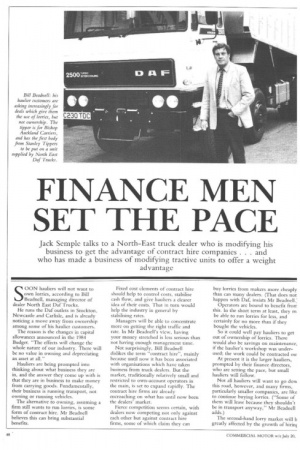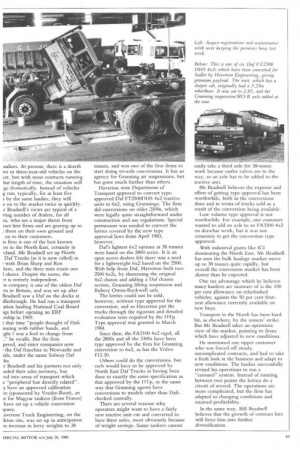FINANCE MEN SET THE PACE
Page 50

Page 51

If you've noticed an error in this article please click here to report it so we can fix it.
Jack Semple talks to a North-East truck dealer who is modifying his business to get the advantage of contract hire companies . . . and who has made a business of modifying tractive units to offer a weight advantage
SOON hauliers will not want to own lorries, according to Bill Beadnell, managing director of dealer North East Daf Trucks.
He runs the Daf outlets in Stockton, Newcastle and Carlisle, and is already noticing a move away from ownership among some of his haulier customers.
The reason is the changes in capital allowances announced in the 1984 Budget. 'The effects will change the whole nature of our industry. There will be no value in owning and depreciating an asset at all."
Hauliers are being prompted into thinking about what business they are in, and the answer they come up with is that they are in business to make money from carrying goods. Fundamentally, their business is running transport, not owning or running vehicles.
The alternative to owning, assuming a firm still wants to run lorries, is some form of contract hire. Mr Beadnell believes this can bring substantial benefits. Fixed cost elements of contract hire should help to control costs, stabilise cash flow, and give hauliers a clearer idea of their costs. That in turn would help the industry in general by stabilising rates.
Managers will be able to concentrate more on getting the right traffic and rate. In Mr Beadnell's view, having your money stretched is less serious than not having enough management time.
Not surprisingly, Bill Beadnell dislikes the term "contract hire", mainly because until now it has been associated with organisations which have taken business from truck dealers. But the market, traditionally relatively small and restricted to own-account operators in the main, is set to expand rapidly. The contract hire firms are already encroaching on what has until now been the dealers' market.
Fierce competition seems certain, with dealers now competing not only against each other but against contract hire firms, some of which claim they can buy lorries from makers more cheaply than can many dealers. (That does not happen with Daf, insists Mr Beadnell.; Operators are bound to benefit frorr this. In the short term at least, they rn. be able to run lorries for less, and certainly for no more than if they bought the vehicles.
So it could well pay hauliers to get out of ownership of lorries. There would also be savings on maintenance, if the haulier's workshop was underused; the work could be contracted on.
At present it is the larger hauliers, prompted by their finance directors, who are setting the pace, but small hauliers will follow.
Not all hauliers will want to go dow, this road, however, and many firms, particularly smaller companies, are like to continue buying lorries. ("Some of them will lease because they shouldn't be in transport anyway," Mr Beadnell adds.) The second-hand lorry market will b greatly affected by the growth of hirint .auliers. At present, there is a dearth vo or three-year-old vehicles on the cet, but with most contracts running hat length of time, the situation will ge dramatically. Instead of vehicles g run, typically, for at least five s by the same haulier, they will e on to the market twice as quickly. r Beadnell's views are typical of a ving number of dealers, for all es, who see a major threat from ract hire firms and are gearing up to them on their own ground and on to their customers.
is firm is one of the best known !rs in the North East, certainly in 'eland. Mr Beadnell set up North Daf Trucks (as it is now called) in with Brian Sharp and Ron love, and the three men retain one I shares. Despite the name, the is entirely independent.
le company is one of the oldest Daf rs in Britain, and was set up after Beadnell saw a Daf on the docks at dlesbrough. He had run a transport ation hauling National Coal Board igs before opening an ERF .trship in 1969.
t that time "people thought of Dafs inning with rubber bands, and ght I was a fool to change from he recalls. But the firm pered, and sister companies now the Daf franchise in Newcastle and isle, under the name Solway Daf :ks.
r Beadnell and his partners not only Lnded their sales territory, but red into areas of transport which e "peripheral but directly related". y have an approved calibration re (sponsored by Veeder-Root), an it for Magyar tankers (from France) have set up a vehicle conversion ipany.
laverton Truck Engineering, on the kton site, was set up in anticipation ie increase in lorry weights to 38 tonnes, and was one of the first firms to start doing tri-axle conversions. It has an agency for Granning air suspensions, but has gone much further than others.
Haverton won Department of Transport approval to convert typeapproved Daf FT2500DHS 4x2 tractive units to 6x2, using Grannings. The firm did conversions on older 2500s, which were legally quite straightforward under construction and use regulations. Special permission was needed to convert the lorries covered by the new type approval laws from April 1983, however.
Des lightest 6x2 options at 38 tonnes were based on the 2800 series. It is an open secret dealers felt there was a need for a lightweight 6x2 based on the 2500. With help from Daf, Haverton built two 2500 6x2s, by shortening the original 4x2 chassis and adding a Daf chassis section, Granning lifting suspension and Rubery Owen-Rockwell axle.
The lorries could not be sold, however, without type approval for the conversion, and so Haverton put the trucks through the rigorous and detailed evaluation tests required by the DTp. Type approval was granted in March 1984.
Since then, the FA2100 4x2 rigid, all the 2800s and all the 3300s have been type approved by the firm for Granning conversion to 6x2, as has the Volvo F12.20.
Others could do the conversions, but each would have to be approved by North East Daf Trucks as having been done to exactly the same specification as that approved by the DTp, in the same way that Granning agents have conversions to models other than Dafs checked centrally.
There are several reasons why operators might want to have a fairly new tractive unit cut and converted to have three axles, most obviously because of weight savings. Some tankers cannot easily take a third axle for 38-tonne work because outlet valves are in the way, so an axle has to be added to the tractive unit.
Mr Beadnell believes the expense and effort of getting type approval has been worthwhile, both in the conversions done and in terms of trucks sold as a result of the conversion being available.
Low volume type approval is not worthwhile. For example, one customer wanted to add an axle to an FA3300 4x2 on drawbar work, but it was not economic to get the conversion type approved.
With industrial giants like ICI dominating the North East, Mr Beadnell has seen the bulk haulage market move up to 38 tonnes quite rapidly, but overall the conversion market has been slower than he expected.
One tax advantage which he believes many hauliers arc unaware of is the 100 per cent allowance on refurbished vehicles, against the 50 per cent firstyear allowance currently available on new buys.
Transport in the North has been hard hit, as elsewhere, by the miners' strike. But Mr Beadnell takes an optimistic view of the market, pointing to firms which have adjusted to new conditions.
He mentioned one tipper customer who was forced off steady, uncomplicated contracts, and had to take a fresh look at the business and adapt to new conditions. The haulier successfully revised his operations to run a carousel" system. Instead of running between two points the lorries do a circuit of several. The operations are more complicated, but the firm has adapted to changing conditions and retained profitability.
In the same way, Bill .Beadnell believes that the growth of contract hire will force 'him into further diversification.




















































































